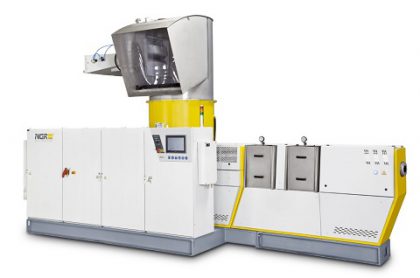Feldkirchen an der Donau / Austria: The NGR C:GRAN series has been extended to machines for outputs of 2,200 kg/h and over. This expansion follows the market trend of increasing plastic recycling quantities and modernization of recycling plants to satisfy the increased demand for high-quality rPellets.
The rapidly increasing recycling quantities of plastics are driven by expectations and specifications from European legislation, which will continue to rise in the coming decade. However, the recycling industry is not only facing a quantitative challenge – the quality of rPellets must also be comparable with that of virgin pellets in order to provide plastics processors with the raw material security they are already accustomed to.
“NGR has a broad portfolio of recycling machines with very different, specialized technologies. We recommend shredder-feeder-extruder combinations, especially for dry industrial waste – but for high moisture mixed plastics from the post-consumer waste stream, cutter-compactor-extruder combinations offer advantages,” explains Patrick Steinwendner the strategic and technological access to the market. Mr. Steinwendner is Product Manager and Marketing Manager at NGR.
The noticeable market dynamics are affecting every area of the recycling value chain, although the material qualities of collected plastics from household collections are stagnating at a rather low level. In order to still be able to produce high-quality rPellets, manufacturers of sorting plants, washing plants and finally recycling machines are therefore even more challenged in the direction of innovation.
The inline measurement of the most important plastic properties offers the rPellets manufacturer the possibility to determine the quality of the plastic melt already during the recycling process and to initiate appropriate sorting measures or additive feeds immediately. The automated quality recording of MFI, mechanical and optical properties (colour, polymer defects) and polymer recognition create the necessary confidence in the rPellets processor and provide information on the quality level via data acquisition compared to the preliminary processes.
The demand for larger recycling machines and automated quality records is a clear sign of increasing efficiency pressure on the recycling industry.
“Thanks to the modular design of the NGR systems, we can significantly reduce development times. In this project, we were able to assemble over 80% of the system components from parts that had already been tested in other machines – this is very much in line with our rapidly changing market and customer requirements,” says Ing. Thomas Pichler, Technical Director and co-owner at NGR.
The last article about “NGR” that was published at this channel was: Integrated Direct Production of high-quality rPET sheets from PET waste












